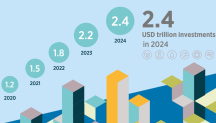

Growing Sustainably with Bioenergy
Newsletter
IRENA, FAO and IEA agree bioenergy can help meet sustainable development goals
Bioenergy is the most widely used renewable energy source worldwide, and IRENA estimates it could account for half of the renewable energy needed in 2030 to meet climate targets. But to gain the support of the public, expanded use of bioenergy must be socially, economically and environmentally sustainable.
A Round Table at the European Biomass Conference and Exhibition on 13 June 2017 in Stockholm, Sweden, provided an opportunity for IRENA, the UN Food and Agriculture Organization (FAO), and the Bioenergy Cooperation Programme of the International Energy Agency (IEA) to set forth a joint briefing paper on Bioenergy for Sustainable Development. The paper points out that bioenergy can help meet the UN’s Sustainable Development Goals for climate change action, food security, sustainable land use, and access to affordable, reliable, modern sustainable energy for all.
“Significant amounts of bioenergy can be produced without jeopardizing food production or emitting carbon to the atmosphere,” says Jeffrey Skeer, a Senior Programme Officer engaged in IRENA’s bioenergy work. “As pointed out by the panellists and participants, bioenergy can also promote development, create jobs, enrich the land and improve livelihoods.”
Bioenergy’s flexibility means it can play a role in every energy end-use sector: in the power sector, by balancing variable renewables like wind and solar; in process heat and materials for industry; in heating systems and stoves for buildings; and in displacing fossil fuels for transport — especially for aviation, marine shipping and heavy freight transport. “Policy makers need to know that bioenergy development can be done sustainably so they will feel motivated to actively support it,” says Skeer.
In the briefing paper, IRENA and partners argue that substantial amounts of bioenergy can be produced sustainably from farm and forest residues. They also note that large amounts of land can be made available for energy crops, while meeting food needs, by boosting food crop yields, restoring degraded land, and reducing losses in the food chain.
A recently released IRENA report, Biofuel potential in Southeast Asia: Raising food yields, reducing food waste and utilising residues, highlights Southeast Asia’s considerable resources to produce biofuels sustainably while avoiding carbon-dioxide emissions or food supply interference. A global picture of such resource potential is presented in an earlier IRENA report on Boosting Biofuels.




